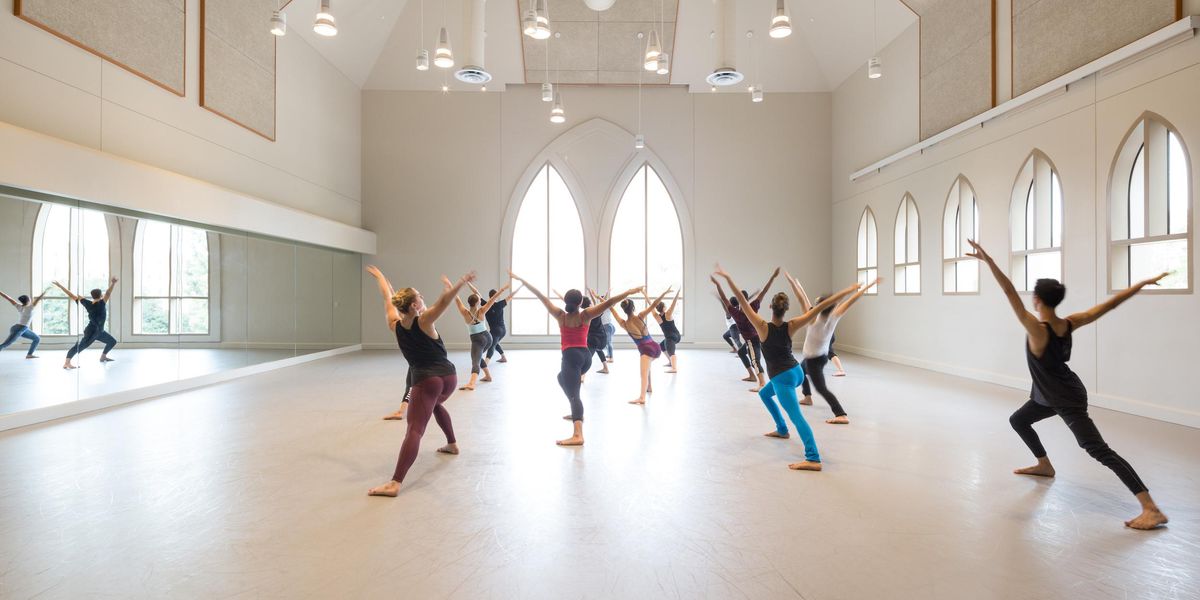Summer Slump
Don’t let an unexpected problem derail your summer intensive.
Jacob’s Pillow summer intensive students in performance. Photo by Jamie Kraus, Courtesy Jacob’s Pillow.
When Laura Faure was 20 years old, she was thrilled to attend American Dance Festival for the summer. But at the very start of the program, she badly sprained her ankle. “I was devastated,” she remembers. “I was supposed to be studying with some amazing people, but there was no way I could dance. Instead, I had to limp around and observe. It was incredibly frustrating.”
Now the director of Bates Dance Festival, Faure knows firsthand how shattering it is for her students when, after months of preparation and anticipation, their summer doesn’t go as planned. Still, there are ways to get everything you can out of the experience.
When Injury Gets in the Way
Your first instinct when you get injured at a summer program may be to pack your bags, or worse, hide an injury in fear of being sent home. But first, ask a medical professional about your options and focus on what you
can do. For injuries that only require a couple days of rest or slight modifications to your dancing, most directors will be willing to accommodate. You may be allowed to temporarily observe classes, only take barre, move into a lower level or substitute technique classes with low-impact ones, like Pilates or yoga.
If you have an injury that will take you out for the entire session, sticking around can make for an emotional roller coaster, since you’ll have to watch your peers improve from the sidelines. Still, since most programs’ tuition is nonrefundable, Faure encourages dancers to stay and load up on any classes that won’t put stress on their bodies. Bates, for example, offers non-movement courses like Business of Dance and Film and Media. “Of course, it’s hard getting around campus on crutches,” Faure says. “And there are students who are so discouraged that they need to go home.”
If you decide to stay, use your time wisely. Ask the program’s physical therapist for exercises that will help you heal. BalletMet Academy director Timothy Lynch encourages injured dancers to bring a notebook to every class they observe. “Write down corrections the teacher gives or combinations you’d like to try when you’re feeling better,” he says. “Being injured is never fun, but it can offer a chance to investigate your training in a different way.”
When You’re Feeling Overwhelmed
Summer intensives are called intensives for a reason. The hours are long, the classes are challenging and the dancers are talented. If you start to feel like you’re in over your head, speak to someone at your program you trust—a faculty member, resident assistant or teacher. You may be able to form a plan to help things feel more manageable. For example, Lynch remembers a dancer telling him she wasn’t used to spending the whole day in pointe shoes, so he allowed her to wear flat shoes for afternoon classes. Adjusting your schedule or technique level may also be an option.
Most importantly, focus on taking care
of yourself emotionally. That may mean talking to a psychologist about any emotional
distress, practicing mindful exercises like taking deep, slow breaths, or finding a quiet place to journal every day. And don’t forget to be kind to your body. “Focus on proper nutrition and get plenty of rest,” says J.R. Glover, director of education at Jacob’s Pillow. “You have to keep your body ready for professional-level work.”
When You’re Not Feeling Challenged
Bates Dance Festival. Photo by Phyllis Graber Jensen, Courtesy Bates.
If you feel you’ve been put in a class level below your ability—especially if your placement was determined by an audition that happened months earlier—it doesn’t hurt to speak up. Let your teachers know you’d like to be re-evaluated, and ask if it would be possible to switch to a higher level. At BalletMet, the first two days of the program are used to make sure students are in the right class, and it’s rare that students’ levels will change after that.
Try to make the most of your summer by using the unexpected pace as an opportunity for growth. “After a certain point, you
should go back and take the beginner’s class,” Glover says. “There’s a lot of merit and maturity in that. If something isn’t moving fast enough for you, challenge yourself to find the work involved in the slowness.”
Remember that part of the appeal of a program away from home is the introduction to different styles and repertory. Even if it feels more tedious or not as complex as what you’re used to, exposure to new techniques, teachers and choreography—and challenging yourself to truly master the nuances, alignment and intentions that come with them—will only make you a stronger dancer.




